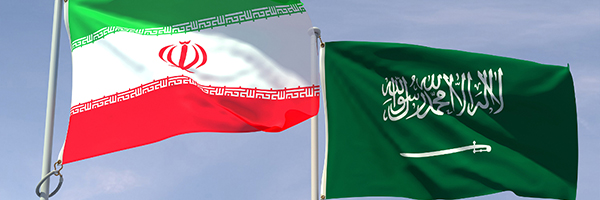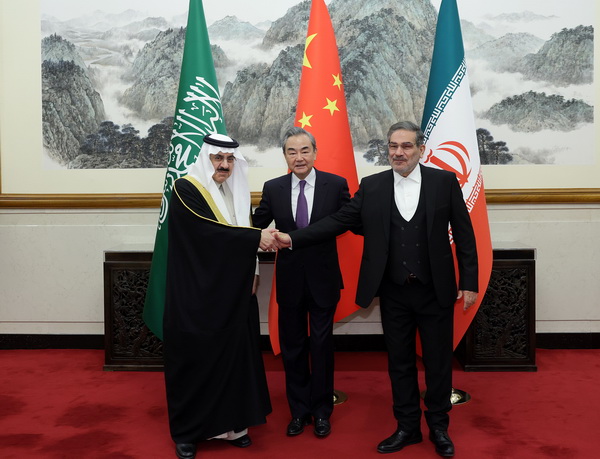Saudi Arabia, Iran agree to resume ties, reopen embassies after talks in Beijing
 March 10, 2023 — China willing to continue playing constructive role in improving relations: top diplomat.
March 10, 2023 — China willing to continue playing constructive role in improving relations: top diplomat.The news came Friday night attracting worldwide attention, and is seen as a breakthrough in bilateral relations for longtime regional foes Iran and Saudi Arabia. Some analysts praised the efforts made by the two countries and China in seeking peaceful settlements of disputes amid global growing uncertainties.
On Friday, Wang Yi, director of the Office of the Foreign Affairs Commission of the Communist Party of China (CPC) Central Committee held the meeting between the Iran delegation headed by Ali Shamkhani, Secretary of Iran’s Supreme National Security Council and the Saudi Arabia delegation headed by Musaad bin Mohammed Al-Aliban, Minister of State, Member of the Council of Ministers, and National Security Advisor of Saudi Arabia. The joint statement was released after the meeting.
As per the joint statement reached by the three countries, Iran and Saudi Arabia have agreed to resume diplomatic relations within two months and reopen embassies and agencies in both countries. The foreign ministers of the two countries are to hold talks aimed at implementing the decision and make the necessary arrangements for the exchange of ambassadors.

As announced by China on March 10, 2023, Saudi Arabia and Iran, the latter two have reached a deal which includes the agreement to resume diplomatic relations and reopen embassies and missions within two months. Photo: Chinese Ministry of Foreign Affairs
Stressing respect for sovereignty and non-interference in each other’s internal affairs, the two countries agreed to implement the agreement on security cooperation signed on April 17, 2001, and the general agreement reached on May 27, 1998, aimed at fostering ties in economic, commercial, investment, technical, scientific, cultural, sports, and youth arenas.
The three countries also expressed firm resolve to make every effort to strengthen regional and international peace and security.
Wang congratulated the two countries on taking a “historic step” in improving bilateral relations. The two countries have also laid the foundation for follow-up work by outlining the timetable for dealing with each side’s concerns.
Wang told reporters on Friday that the Iran-Saudi Arabia talks in Beijing have achieved a significant outcome and are a victory of dialogue and peace, bringing very good news to an unsettled world.
Wang also noted that the outcome sent a clear signal that the Ukraine crisis is not the only problem in the world and there are many issues concerning peace and people’s livelihood that call for global attention and proper handling.
No matter how complicated or thorny some issues are, maintaining the spirit of mutual respect to seek equal dialogue can help each side reach a settle-ment. Wang also stressed that the Middle East belongs to local people and the region’s destiny should be held fast in the hands of peoples in the region’s countries. They can build a more stable, peaceful and prosperous Middle East by strengthening coordination.
The improvement in Iran-Saudi Arabia relations is of great importance not only to the region and the Islamic world, but also to the world – it injects some certainty to the Middle East as the world is still feeling the impact of the Russia-Ukraine conflict and boosts confidence in peace and development, Zhu Yongbiao, executive director of the Research Center for the Belt and Road at Lanzhou University, told the Global Times on Friday.
The breakthrough may bring an amplifying effect to the region, encouraging more regional countries to alter previous hostile foreign policies and seek possible cooperation with a more inclusive mentality to create more room for regional development, said Zhu.
By improving relations, Iran and Saudi Arabia have opened the door to peace in the Middle East, and set an example for settling disputes via dialogues. As a trustworthy friend of both Iran and Saudi Arabia, China is willing to continue playing a constructive role, Wang said.
The dialogue is also a successful application of the Global Security Initiative. As a kind and trustworthy mediator, China has fulfilled its responsibility as a host and will carry on being a constructive player in promoting the proper handling of global heated issues in accordance with each side’s willingness, said Wang.
Ali Shamkhani and Musaad bin Mohammed Al-Aliban also spoke highly of China’s major country diplomacy and expressed appreciation to China for hosting and promoting the meeting, and said they are willing to implement the consensus reached at the meeting to strengthen the neighborhood and jointly defend regional stability.
On top of the great efforts made by Iran and Saudi Arabia to make the breakthrough, China has also contributed to coordinating regional countries in settling thorny issues. This also highlights China’s increasing influence in the region and globally, said Zhu.
However, some external countries may not want to see such positive improvements in the Middle East, analysts said, warning of possible interference and calling on countries in the region to continue to seek dialogue and negotiations when handling regional disputes.
